| Supporters Homepage |
Details
Name: Matthew McGinn
aka: Matt McGinn, ‘Tim’ McGinn, McGinn of the Calton
Born: 17 Jan 1928
Birthplace: Gallowgate, Glasgow
Died: 5 January 1977
Ref: A Legendary Scottish folk singer-songwriter, actor, author and poet, born in Glasgow who was a highly influential figure in the British folk music revival of the late 1950s and early 1960s, influencing then young singers like Bob Dylan. He was also a big Celtic fan too.
Overview
There are so many incredible m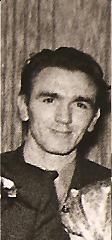 embers of the Celtic support & diaspora, but one name that deserves greater recognition is that of Matt McGinn.
embers of the Celtic support & diaspora, but one name that deserves greater recognition is that of Matt McGinn.
His impact was so much beyond Scotland’s border and incredibly he is said to have had a profound impact on the young aspiring legend to be Bob Dylan!
When the American protest singer Pete Seeger took Matt McGinn over to America to play in the renowned Carnegie Hall in New York for a gig, the then young Bob Dylan was further down the list. Bob Dylan is said to have later sought the advice of Matt McGinn about touring the UK, about which the Scottish folk musician reflected on later, writing:
“It was almost my first paid engagement at a fee of 200 dollars against Bob Dylan’s 60 dollars!”
The great Pete Seeger remained friends with Matt McGinn for life, and recorded many of his songs.
His style of combining stories, jokes and song was apparently what influenced Billy Connolly’s stage performances too. So a broad influence on different acts.
He had come from a very humble background, born in Calton (Glasgow), the eighth child in a large Irish family in Glasgow. He left school at 12 and worked in a factory in Hillington (GKN), but as a self taught intelligent man, he won a Trade Union scholarship to study economics & political science at Ruskin College in Oxford at 31, and thereafter became a teacher in Lanarkshire.
He joined the folks music scene and won plaudits and many admirers, as already mentioned earlier. He was a notable seminal artist of the folk song revival scene during the 1960s, but unlike others his heart was based in that of Glasgow & the West of Scotland. He was strongly left wing in his politics, and used his musical talents as a vehicle to promote those beliefs.
He was also a big Celtic fan, no surprise coming from the Calton region and coming from an Irish Catholic background. He even once wrote a song which celebrated the Lisbon Lion success of ‘67 entitled, ‘The Bhoys of Lisbon’, but also reflecting his sense of working man solidarity & respect, he wrote another in memorial to those who died in the Ibrox Stadium Disaster of 1971 (RIP).
There is even a pub named after him at the foot of Glasgow’s Hope Street which is carved into the walls of Central Station currently named ‘McGinn’s’ and previously monickered ‘The Two Heided Man’ in homage to one of his most beloved tunes.
McGinn sadly died prematurely on 5 January 1977 of smoke inhalation, aged 48 (12 days short of his 49th birthday) after falling asleep with a lit cigarette in his hand. The post mortem revealed that there was no trace of alcohol in McGinn’s blood.
In January 2019 a blue plaque for McGinn was installed in the Calton district of Glasgow’s East End.
To summarise his philosophy in life, he once said:
‘My job here is not to tell the kids to do this or do that, but to be there if they want help. Another important, if unofficial job, is to give them lights for their fags.’
Another great & interesting man whom we should be proud to be able to number amongst our own.
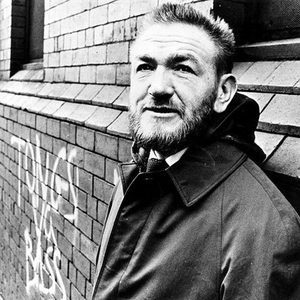
Vids
Links
Articles
Glasgow honours Matt McGinn, folk hero who was once bigger than Dylan
This article is more than 3 years old
Blue plaque for influential Scots singer-songwriter unveiled three decades after his death
https://www.theguardian.com/music/2019/jan/20/scotland-honours-matt-mcginn-folk-singer-once-bigger-than-dylan
Matt McGinn (1928-77) in the Gorbals district of Glasgow in 1967. Photograph: Brian Shuel/Redferns
Kevin McKenna
Sun 20 Jan 2019 09.00 GMT
For years James Scott was frustrated by the lack of recognition given to one of his favourite musicians, the folk singer and songwriter Matt McGinn, who died in 1977. Although he was feted in radical folk circles, McGinn’s name was largely unknown and his talents overlooked. Scott decided that needed to change, and set about raising £1,000 for a memorial.
“I did this because I am a great McGinn fan and I think he has just been totally ignored,” he told the Glasgow Evening Times. “It’s a great shame. He wrote all those great songs and he is in the Robert Burns category as far as I am concerned. Only Burns, as regards Scotland, has written so many songs and poems. We raised the money for the tribute very easily.”
On Saturday, in the Calton district of Glasgow’s East End, the fruit of Scott’s labours paid off as fans gathered once more to salute someone they regard as one of Britain’s most influential folk artists. Since his death aged 48, after a fire in his home, there have been anniversary tributes here and there for a man who wrote prolifically and who launched Billy Connolly – one of his early backing musicians – on the road to worldwide fame. But the extent of McGinn’s talent and achievements has been strangely forgotten in a country that specialises in garlanding its popular heroes. Aficionados now have a permanent memorial – a plaque – to remember him by, unveiled just yards from where McGinn was born, the eighth of nine children in an Irish-Catholic household.
Further along this road is Celtic Park, home of Celtic FC, while the once-vivid Barras market, now emasculated, is its other famous tenant.
McGinn giving an evening class at East Kilbride high school, 1972.
McGinn giving an evening class at East Kilbride high school, 1972.
Photograph: Mirrorpix/Alamy
Most of what is known about McGinn of the Calton, as they called him, comes from those who saw him in concert. His singing was untutored and he didn’t play an instrument, but the word “gravelly” pops up often in contemporary reports. His songs were vibrant portrayals of working-class life in Glasgow and scabrous reflections on social issues. They were drenched in a rude wit that meant he rarely featured on the TV shows that made household names of much lesser talents.
Advertisement
Willy Maley, writer and professor of renaissance studies at Glasgow University, said: “He is the missing link between two other great Scots, James Connolly and Billy Connolly. He was a campaigning cultural figure who combined political protest, socialism and trade unionism with earthy humour and a terrific line in Glasgow patter.
“He was a stalwart of the 1960s folk scene and shared a stage with the likes of Pete Seeger, yet for all this he deserves to be better known and more widely marked than he is, in all his creative guises: writer, poet, actor, performer. He should be celebrated as one of Scotland’s greats. The Calton district of Glasgow gave rise to some tremendous characters and McGinn exemplifies the type – resourceful, inventive, ingenious and brilliantly witty.”
One of McGinn’s crowning achievements was appearing near the top of the bill at Carnegie Hall in New York at the invitation of Seeger. There he encountered Bob Dylan, who sought out his advice about touring the UK. McGinn wrote afterwards: “It was almost my first paid engagement at a fee of 200 dollars against Bob Dylan’s 60 dollars.”
After studying at Ruskin College, Oxford on a trade union scholarship, McGinn had his folk epiphany when he won a local newspaper competition in Huddersfield for a song called The Foreman O’Rourke, about a factory worker who flushes his boss down a toilet. His best-known works include The Red Yo-yo, The Rolling Hills of the Border, Skinny Malinky Longlegs, The Ballad of the Q4 and The Ibrox Disaster.
Writing in 1964 in the journal Folklore, Hamish Henderson, the Scottish poet, songwriter and fellow communist, said of McGinn: “Nearly all his songs have merit, as well as high entertainment value. He was born in the Gallowgate district of Glasgow and his songs have the gallus sardonic verve of that area. I’d back at least half a dozen of them to ‘bide’ – for a while, at least.”
Singer McGinn was a bigger draw than Bob Dylan at Carnegie Hall
31st December 2016
By KEN SMITH
https://www.heraldscotland.com/news/14995817.singer-mcginn-bigger-draw-bob-dylan-carnegie-hall/
Matt McGinn
LOOKING moodily over the photographer’s shoulder is one of Scotland’s cleverest song-writers -–Matt McGinn, who helped revive folk music and protest songs in the 60s.
Alas, he died too young at the age of 49 in 1977.
Born in Calton, Glasgow, he spent time in an approved school before getting a job in a Hillington factory. But, thanks to a trade union scholarship, he was later able to attend Ruskin College in Oxford and returned to Glasgow to work as a teacher.
The songs he wrote ranged from ditties for children, to the daftness of The Big Effan Bee – a bee in the fictional town of Effan. But many other songs hit home on the plight of the working classes. His Three Nights And A Sunday (Double Time) was an attack on smug workers who grabbed all the overtime going at the expense of other workers’ jobs.
American protest singer Pete Seeger took Matt over to the Carnegie Hall in New York for a gig at which a young Bob Dylan was further down the list.
Matt also entertained audiences with his stories and jokes, which was a style later adopted and polished by Billy Connolly. In fact, a young Billy was on the bill at a Glasgow University gig with Matt but had to pull out at the last minute. Matt went on stage and announced: “Our next act Billy Connolly needs no introduction – because the b****** didnae turn up.”
Oh and collectors of graffiti will appreciate the “Tongs Ya Bass” on the wall behind him. Whatever happened to them?
Matt McGinn: The Calton Folk Hero and Famous Tim
https://seanmcdon.org/2019/02/15/matt-mcginn-the-calton-folk-hero-and-famous-tim/
seanmcdon18 Celtic FC, Culture, Football – Celtic FC Culture, History, Miscellaneous February 15, 2019 5 Minutes
That roughly cut gemstone of Glasgow’s East End, The Calton, which has been home to my paternal bloodline since 1910, is an area synonymous with The Celtic.
Like father and son, they go hand in hand.
As most of us know it’s the Calton whereby the founding of the club was to take place in St. Mary’s RC Church halls in 1887 and many decades later it’s the wider Calton community inclusive of the since eroded ‘Mile End’ district which socially sculpted a real Celtic legend – Tommy Burns – after his birth in the now disappeared Soho Street.
Not to mention that the Calton is an area long associated with Irish Catholic migration and the semi ghettoisation of subsequent generations of these fine, industrious and harshly treated folk in the time that followed after the dark An Gorta Mor period (The Great Hunger 1845-1851).
The Irish Catholic migrant and their Scottish born generations thereafter, who would be socially and economically excluded from most major skilled industries within Britain’s alleged ‘Second City’, would come to call places like the Calton their home by mid 19thC.
This led to brick and mortar of St Mary’s RC Church in 1842 being set which, in a sense, legitimised the presence of the Irish and future generations of Scottish born Catholics, within the area.
Clearly the Celtic credentials of the Calton are not, and never will be, in question.
Calton Legend: Matt McGinn
However, what has perhaps been less present within the Calton – Tim narrative is the extent to which one of the Calton’s local legends of international significance, Matt McGinn, was also steeped in pure, undiluted Tim culture.
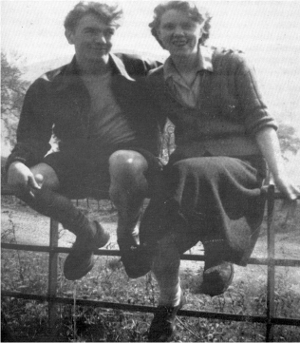
A Youthful Matt with wife Janette
McGinn, the unrivalled Scottish folk singer, would go on to inspire the likes of Bob Dylan, Christy Moore and Billy Connolly whilst collaborating with international folk song revival heavyweights such as Pete Seeger (This Land is Your Land).
There is even a pub named after him at the foot of Glasgow’s Hope Street which is carved into the walls of Central Station currently named ‘McGinn’s’ and previously monickered ‘The Two Heided Man’ in homage to one of his most beloved tunes.
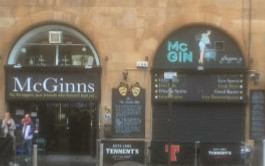
McGinn’s Pub – Hope Street, Glasgow
But the connection between McGinn and Celtic deserves more light to be shone upon it.
Matt McGinn the Calton Tim
McGinn, whose life would sadly and prematurely come to an end in 1977 due to accidental death by fire, was born at the corner of Ross Street and the Gallowgate in 1928. Regular Barras Tim drinkers will realise that this is the opposite end of the street from the famous Tim haunt, ‘Lynch’s Bar’. A site which has recently been commemorated by a very long overdue wall plaque.
After suffering early institutionalisation at the hands of an Approved School system as is documented in the biographical book he wrote entitled ‘Fry The Little Fishes’, McGinn would go on to flourish at Oxford University no less as a result of gaining a scholarship in Politics and Economics which was funded by the Trade Union movement.
Post graduation, McGinn, by this time a card carrying and very vocal Communist, used his music as a platform for his political beliefs and it is here that one can spot a clear Celtic parallel with McGinn.
Regardless of the political persuasion, the idea that music can be successfully used as a vehicle for political beliefs or cultural identity is something synonymous with Celtic and our proud family’s heritage and most likely always will be.
Whether you agree with the Celtic supporters endorsement of various political or cultural viewpoints from the terraces, one thing that cannot be debated is the extent to which it has always existed at some level within the ground through song and chant.
McGinn’s Ode to Lisbon
There are more direct connections between McGinn and Celtic however.
By analysing McGinn’s discography and almost hidden within the plethora of famous political folk song, spoken word, comedic chorus or even nursery rhyme (Jeely Piece Song, Little Ticks of Time) eventually we come across a song about one of his first loves – Celtic Football Club.
Specifically, a song which celebrated the Lisbon Lion success of ‘67 entitled, ‘The Bhoys of Lisbon’, this catchy and melodic chorus consisted of,
‘We’re the Bhoys who shook up Lisbon, we showed Inter some of our tricks,
In the year of ‘67 sure our trophies numbered 6,
Home or away we’ll always play a game that’s neat and clean,
And we’ll give three cheers for Celtic and their guid aul’ manager Stein’
(Check the YouTube link attached at the foot of this article to listen to it in its entirety)
McGinn: The Community Champion
As detailed, the Calton’s Matt McGinn was a vocal, charming and very well respected Leftist who fought the good fight for Republicanism and Independence whilst yearning for the days of Global Imperialism to come to an end.
The downtrodden man was his comrade and his betterment through structural social and economic change was McGinn’s mission to be accomplished through awareness in song.
It should also not be forgotten that McGinn, like many a Glasgow socialist before him such as Wheatley or Maxton, ensured that he made as much of a difference as he possibly could in relation to local issues too.
For example, he was instrumental in securing the sizeable grant needed from the Glasgow Corporation in the ‘60s to help provide for an Adventure Playground within one of the cities, and indeed developed Europe’s, most deprived urban areas of its time – The Gorbals.
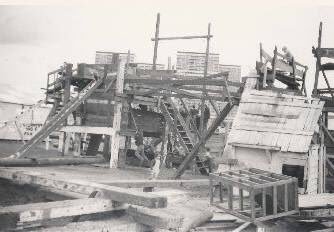
The Venny (Gorbals) Source: @statueforbenny
The ‘Venny’ as it was known, was one of the first of its kind in the city complete with rope and large tyre swings, chutes and other assorted shoogly wonders. A wooden and chain mecca for its urban pilgrims in need of salvation from the crumbling Victorian tenements and backcourts of a badly malnourished postwar inner city locale.
The quote from McGinn himself in relation to his Venny superintendent duties sum it all up fittingly,
‘My job here is not to tell the kids to do this or do that, but to be there if they want help. Another important, if unofficial job, is to give them lights for their fags.’
https://www.google.com/amp/s/www.eveningtimes.co.uk/lifestyle/13283853.amp/
His work as local community champion allows us all to fully appreciate yet another striking Tim parallel. The idea that he should be pivotal in securing a venture which was helping the excluded children of his time is very much cut from the Tim cloth. Clearly his principles and ethos about helping those less fortunate urban souls than ones self are in tune with the origins of Celtic Football Club also.
Lastly…
Matt McGinn, undoubtedly one of Scotland’s finest literary exports and politicised folk heroes, should be much more well known as a famous Tim however, as this piece has argued.
For me, It’s only upon summarised reflection that the Tim parallels of McGinn’s life are stupidly obvious to see.
For instance, let us consider that McGinn was a Calton born working class descendent of an Irish migrant family who experienced social exclusion in his youth.
But through hard work and education he would go on to etch out his own destiny where he would gain success, recognition and admiration for being world famous within his chosen artform, whilst never being shy of offering politicised comment.
Symbolically speaking, McGinn is the personification of the Celtic and their, or rather our, story.
It doesn’t really get much more Celtic minded than that now does it.
Hail, Hail Matt.
Celebration of Matt McGinn’s life
By Alex Robertson
http://news.bbc.co.uk/1/hi/scotland/glasgow_and_west/6278501.stm
BBC Scotland news website
Glasgow and West reporter
Matt McGinn
Matt McGinn was said to reflect Scotland’s passion and humour
This was how it once was – one singer, one song and a party in the front room where everyone knew the words.
Family, friends and neighbours would gather and borrow from Glaswegian Matt McGinn’s immense body of work.
There would be poems and ballads, politics, tragedy and comedy and lots of laughter amid lots of tears.
He was a local hero. And for one night those memories were rekindled in St Andrew’s in the Square as artists paid tribute to a giant of the folk scene.
His songs were delivered with passion before a sell-out audience as Celtic Connections made good on its promise to embrace musical roots.
Thirty years after his death in his beloved Glasgow at the age of 49, his music continues to inspire.
Scotland’s passion
Singer Carol Laula, who performed on the night, said: “Matt McGinn’s tradition has been there in everybody’s family whether we know it or not.
“It appeals to everybody, you can see a grandpa singing it with the wean on his knee.
“It is beautiful music, there is humour and there is heart-wrenching stuff.”
From the moment Partick folk club singer Mick West took the stage, the engaged audience lifted the roof with every chorus.
Matt’s music and lyrics are full of life, joy, sadness, criticism, praise – it is everyday life
Patrick Rolink
Have your say
Duncan McCrone then performed Matt’s version of Loch Lomond.
Mr McCrone played with Matt as a teenager in Glasgow’s pubs and clubs.
“He was a hero of mine,” he said.
“His writing was diverse. He wrote a lot of political songs, funny songs and had an incredibly sensitive side to his nature.
“It seemed to flow out of him, he was unique.
“He was a pure entertainer and could hold the audience in his hands, he was fantastic.”
Patrick Rolink, who hosted the event, said Matt McGinn reflected the nature and beliefs of a nation.
He said: “Matt’s music and lyrics are full of life, joy, sadness, criticism, praise – it is everyday life.
“It is a mixture of feelings and expressions. His passion sums up Scotland as a nation.
“The event has been an absolute joy, great music, great lyrics great comedy.”
Ibrox Disaster: The song Celtic fan Matt McGinn had written about that fateful day
GLASGOW folk singer, and Celtic fan, Matt McGinn penned a song to pay tribute to those who died during the tragic day at Ibrox.
SHARE
ByDailyrecord.co.uk
11:11, 29 DEC 2010UPDATED19:19, 1 JUL 2012
SPORT
GLASGOW folk singer, and Celtic fan, Matt McGinn penned a song to pay tribute to those who died during the tragic day at Ibrox.
Also known as a poet and an author, Matt died in 1977 aged 49.
Below is his song in memory to those 66 supporters.
The Ibrox Disaster
New Year Bells had been ringing,
All of Scotland was singing,
The old year had died,
And the new had been born.
As the news of disaster
From Ibrox came spreading,
The news that would cause
A whole nation to mourn
138397224132